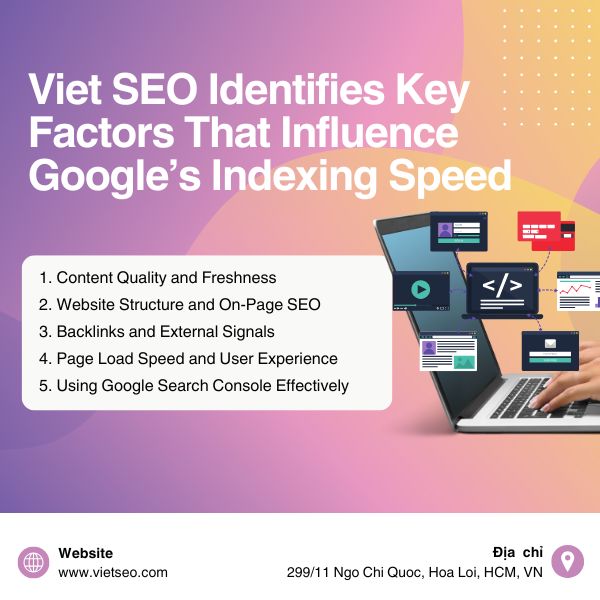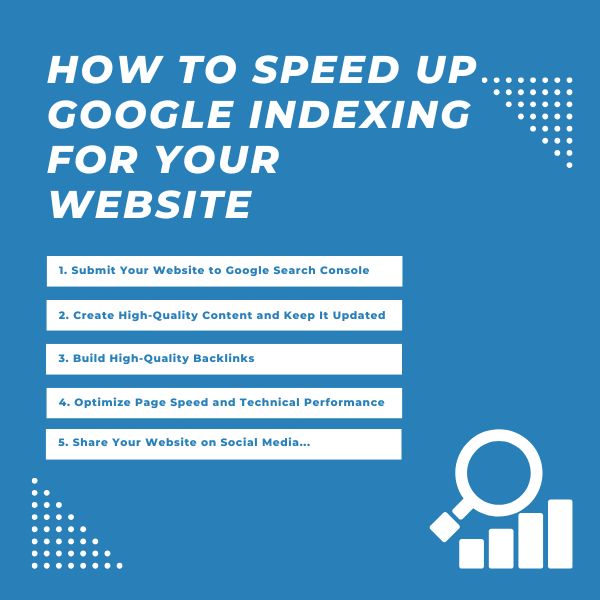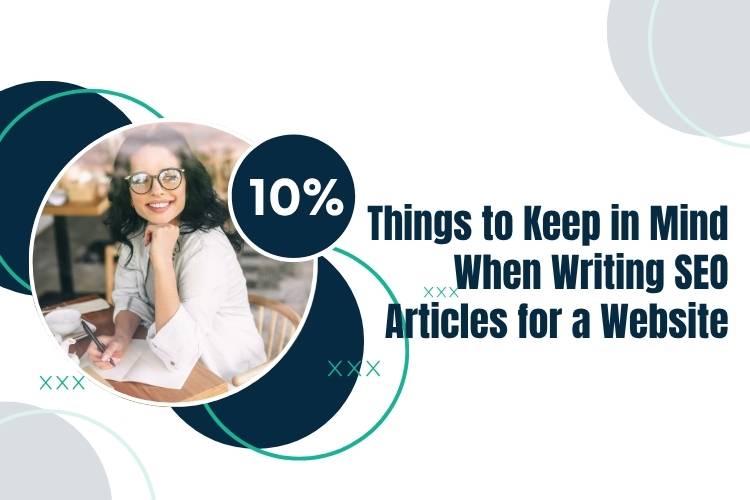How Long Does It Take for Google to Index a New Domain?
So, how long does it take for Google to index a new domain? Is there a way to speed up the process? This article will help you understand Google's indexing timeline, what to do when Google doesn’t index your site, and how to optimize your website for the fastest indexing possible.
How Long Does It Take for Google to Index a New Domain?
There’s no single, fixed timeline for how long it takes Google to index a new website. The process can vary widely depending on how your site is built and optimized. However, based on experience and industry data:
- A well-optimized website can get indexed within just a few hours or a couple of days after being published.
- For newer websites without much content or backlinks, it can take several weeks—or even months— for Google to crawl and fully index all pages.
- On average, for most new domains with basic SEO setup, the indexing process usually happens between 4 days and 4 weeks.
Why such a big difference?
Google uses an automated system called Googlebot to crawl the internet and find new websites. Once Googlebot discovers your site, it evaluates factors like website structure, loading speed, internal linking, and overall content quality to decide when and how to index it.
If your website is technically sound and easy for Googlebot to navigate, it’ll likely be indexed faster. On the other hand, if your site has technical issues, slow performance, or lacks proper SEO signals, Google may take longer to process it.
A professional SEO service - like Viet SEO - can significantly speed up this process. By optimizing your site’s structure, submitting sitemaps correctly, and ensuring all technical elements meet Google’s standards, Viet SEO helps your website get noticed and indexed as quickly as possible.
Viet SEO Identifies Key Factors That Influence Google’s Indexing Speed
The time it takes for Google to index a new domain isn’t random—it depends on a combination of technical and content-related factors. Understanding and optimizing these elements can make a huge difference in how quickly your website appears in search results. Below are the main factors that affect indexing speed and how Viet SEO helps you improve each one.
1. Content Quality and Freshness
Google always prioritizes websites that offer original, valuable, and relevant content.
- If your site contains thin, duplicated, or low-quality content, Google may delay or even skip indexing certain pages.
- On the other hand, publishing high-quality, unique content encourages Google to crawl your site more frequently.
- Regular updates—such as adding new blog posts or improving existing articles—signal to Google that your site is active and worth revisiting.
2. Website Structure and On-Page SEO
A clear and logical site structure helps Googlebot understand and navigate your website efficiently.
- Make sure your site uses clean URLs, proper internal linking, and a hierarchical layout that connects pages logically.
- Optimize title tags, meta descriptions, and headings (H1–H3) to help Google grasp your site’s main topics.
- Check your robots.txt file and meta robots tags to ensure important pages aren’t accidentally blocked from crawling.
3. Backlinks and External Signals
Backlinks act as trust signals to Google, helping it discover and prioritize your site faster.
- Websites that receive links from reputable, high-authority domains tend to get indexed much more quickly.
- Promoting your site on social media, forums, directories, or partner websites also increases visibility, giving Google more opportunities to find and crawl your content.
4. Page Load Speed and User Experience
Google prefers fast, user-friendly websites—both for indexing and ranking.
- A slow-loading site can cause Googlebot to crawl fewer pages per visit, delaying indexing.
- Make sure your website is mobile-friendly, secure (HTTPS), and optimized for Core Web Vitals to ensure smooth performance.
5. Using Google Search Console Effectively
Google Search Console is your direct line to Google’s indexing system.
- You can submit your sitemap.xml to help Google understand your site’s structure.
- Use the “Request Indexing” feature to manually notify Google of new or updated pages.
- Regularly check for crawl errors or coverage issues to fix indexing problems quickly.
At Viet SEO, our experts know how to fine-tune every one of these factors—ensuring your website is technically optimized, content-rich, and fully aligned with Google’s guidelines. The result: faster indexing, better visibility, and a stronger presence in search results.
How to Check If Google Has Indexed Your Website
Wondering whether your website is already visible to Google? There are a few quick and reliable ways to find out. Checking your site’s indexing status helps you identify if Google can access your content—or if there are issues preventing it from appearing in search results.
1. Use Google Search
The simplest way to check if your site has been indexed is through a direct Google search.
- Go to Google.com and type the following command in the search bar:
site:yourwebsite.com - If your website has been indexed, Google will display a list of all indexed pages under your domain.
- If no results appear, it likely means that your website (or specific pages) hasn’t been indexed yet.
Tip: You can narrow your search further, for example:
site:yourwebsite.com/blog
to see whether your blog section has been indexed.
2. Check in Google Search Console
For a more accurate and detailed check, use Google Search Console—Google’s free tool for webmasters.
- Log in to your Search Console account and select your verified domain.
- In the top search bar, enter the exact URL of the page you want to check.
- If the page is already indexed, you’ll see a confirmation message with indexing details such as coverage status and last crawl date.
- If it’s not indexed, click “Request Indexing” to manually ask Google to crawl and index the page sooner.
These simple steps let you track whether your website is being properly recognized by Google. Regularly checking your indexing status—and fixing any crawl issues—helps ensure your site stays visible and competitive in search results.
How to Speed Up Google Indexing for Your Website
Getting your website indexed quickly by Google is essential if you want to appear in search results and attract organic traffic early. While Google’s crawling process is mostly automated, there are several proven strategies you can use to help speed things up. Here’s how to get your new domain or web pages indexed faster and more efficiently.
1. Submit Your Website to Google Search Console
This is the most direct and effective step to help Google discover your site.
- Add your website to Google Search Console to verify ownership.
- Upload your sitemap.xml — this file helps Google understand your site’s overall structure and find all pages more easily.
- Use the “Request Indexing” option to manually ask Googlebot to crawl new or updated pages right away.
Tip: You can also use the “URL Inspection” tool to check if a specific page is already indexed and request indexing instantly if it’s not.
2. Create High-Quality Content and Keep It Updated
Content is one of the strongest signals that encourages Google to crawl your site more often.
- Publish unique, valuable, and well-structured content that genuinely helps readers.
- Avoid duplicate or low-quality articles, which can delay indexing.
- Update your existing posts regularly—Googlebot tends to revisit and index frequently updated sites faster.
3. Build High-Quality Backlinks
Backlinks from authoritative websites act like endorsements, telling Google your site is trustworthy and worth indexing.
- Seek backlinks from reliable, high-domain-authority sites in your niche.
- Participate in guest posting, contribute to forums, and share insights on reputable blogs or media outlets.
- The more credible signals your site receives, the faster Googlebot will crawl it.
4. Optimize Page Speed and Technical Performance
Google favors fast, technically clean websites—not just for ranking, but also for crawling efficiency.
- Use a Content Delivery Network (CDN) to distribute content globally and reduce latency.
- Compress images, minimize CSS and JavaScript, and remove unnecessary plugins or scripts.
- Test your site using Google PageSpeed Insights and fix any issues affecting load times or Core Web Vitals.
5. Share Your Website on Social Media and Other Channels
Social signals help Google discover your pages faster through external traffic and engagement.
- Share your new pages on Facebook, LinkedIn, Twitter (X), and other relevant platforms.
- Participate in online communities, groups, and industry forums to drive referral traffic and build visibility.
- The more your content is shared, the quicker it gets noticed by Googlebot.
At Viet SEO, we recommend performing these optimizations regularly—not just once after launch. By combining strong content, solid backlinks, technical optimization, and consistent promotion, your website will be indexed faster and perform better across Google’s search ecosystem.
Conclusion
Google’s indexing process for a new domain can take anywhere from just a few hours to several weeks. The exact time depends on multiple factors — including your website’s content quality, technical SEO setup, external signals, and how efficiently you submit your site for crawling.
If you want to help Google discover and index your website faster, keep these key actions in mind:
- Submit your website to Google Search Console to notify Google of your new pages.
- Publish original, valuable, and well-structured content that adds real value to users.
- Build quality backlinks from trusted, high-authority websites to increase credibility.
- Optimize your site’s speed and performance so Googlebot can crawl pages efficiently.
- Share your site on social media and online communities to increase exposure and discovery opportunities.
By consistently applying these best practices, you’ll not only speed up the indexing process but also strengthen your site’s visibility, attract more visitors, and lay a solid foundation for long-term SEO growth.
At Viet SEO, we specialize in helping businesses achieve faster indexing and stronger organic performance through a combination of technical expertise, on-page optimization, and strategic link building—ensuring your website gets noticed by Google and your audience sooner.




